- Home
- Eoin Colfer
Novel - Airman Page 28
Novel - Airman Read online
Page 28
“Of course, Marshall.” Linus was hoisted upright and thrust roughly against the gate pillar. Bands of rope crossed his legs and torso, cinching tight enough to burn. Sultan’s footsteps circled around, making him dizzy.
Dizziness without sight. Darned unfair. But at least it seemed he was to live; though with Bonvilain involved, there would definitely be a condition.
“Very well, blind man,” said the marshall’s voice, to his left, low and mocking. “You have earned yourself a reprieve. Deliver this message to the Airman. Tell him that I am hosting a gathering tomorrow night. A small dinner to celebrate the life of Conor Broekhart, which I find amusingly ironic. It will be the third anniversary of his death. Family and friends only. Wine will be served for a special toast, a potent vintage. Very potent. It will seem as though the rebels have managed to infiltrate the kitchen. Tragic.”
Linus did not have the breath for insults.
“Be sure to tell Conor that I am going to all this trouble because of him,” continued Bonvilain, fingers digging into Linus’s shoulder. “If he had remained where I’d left him, then none of this would be necessary; but because he escaped and then stole from me, his brother becomes an orphan. You know, perhaps I will make the infant my ward. Raise him as my own. A little Marshall.” Bonvilain chuckled, enjoying his own twisted sense of humor. “How the people would love me. Noble Bonvilain adopts another man’s child.”
Linus managed a short sentence. “No one loves you, Bonvilain.”
“You’re right,” said the marshall. “And you would think that might bother me; but no, I seem to find all the fulfilment I need in material wealth.”
Sultan moved, bowing, into Bonvilain’s line of sight. “Marshall, those flares could attract attention.”
Bonvilain was disappointed. No doubt the villagers would come to investigate the flares. No more time for gloating. A pity—he enjoyed it so, and there were all too few occasions. Ah well, poisoning the queen and the Broekharts was something to look forward to. And with any luck, Conor would throw himself into the pot, too. And even if he did not, Bonvilain would soon be prime minister, and nothing anyone said would be able to change that.
Time for one last word with the blind man. “I suppose the Irish will untie you,” he said. “But even so, do not run away. Remain here and deliver my message, or your master will not even have the chance to kill himself attempting to foil my plans.” Bonvilain slapped Linus hard across the cheek. “After that, spend the rest of your life wondering when I will kill you. As we know, you will not see me coming.”
Linus kept his lip stiff and his frown in place, but he was breathing hard through his nose, and had the ropes not held him, he would surely have collapsed.
I hate myself for feeling this terror. I have seen war and plague. I have lived in darkness with the ever present fear of pain. But terror? Never before, until now.
“Damn you, Marshall,” he sobbed defiantly. “The devil take you.”
But he knew by the hollowness of the air and the drift of his voice that he was alone. Bonvilain had gone to make preparations for his celebration.
I should be happy, Conor Finn thought. My plan has succeeded and I am a scientist again, with funds to continue my experiments far into the future. I should be at least content.
But he could not escape the knowledge that this was not his life. He was skirting the borders of his life as though banned from entering. And somewhere, just beyond his reach, another true life was waiting.
Farther away will be better. How can I start again, when every time I raise my eyes, I see the Saltees on the horizon?
Conor was steering his horse and cart down the coast road to Wexford, and from there to Curracloe beach, five miles on the other side. It was already noon, as it had taken longer than expected to winch the wings down the side of the tower. He would have to sleep on the beach for an extra night, perhaps two, depending on conditions.
The journey, too, would take longer than expected. They had traveled less than a mile from Kilmore, and already the horse had tired from such a load. Wings, engine, tail, body, and of course, his new propeller. It was a heavy burden for an old horse. He would see about trading the beast in on the Wexford docks.
He thought of Linus, and laughed aloud. My mind compares Linus to an old beast. He would not be happy to hear that. With Linus Wynter on his mind, he glanced over his shoulder to check for flares, as he had a dozen times already on this trip.
As if Linus needs me. As if Linus needs a . . .
The flares were up. All of them, it seemed. Pirouetting to earth, leaving pink trails like the spokes of a ghostly umbrella.
Linus was in trouble. It must have something to do with last night’s encounter. It could not be coincidence.
Conor pulled the cart off the road, driving it deep into a wooden copse. The horse complained, shying away from low branches, but Conor drove her on, wedging the cart tight between two trunks. The trees shook, raining pine needles down on man and horse.
In seconds, Conor had unhitched the horse and was urging her back along the coast road. With this animal, there were two choices. He could run her short and fast, or slow and long. Conor chose fast; something told him that long would be too late.
Conor arrived at the tower to find his only friend tied to a pillar, his face and neck rent with contusions. His first thought was: Dead. I have lost him again. But then the old man coughed. “Linus!” he said, taking the American’s weight. “You’re alive.”
Wynter seemed surprised. “Conor. I didn’t hear a horse.”
“She collapsed outside the village. Her heart, I imagine.” He quickly sliced through the rope, sliding his friend down along the pillar.
“You won’t die today,” said Conor, conducting a quick check for broken bones. “But there’s not a piece of skin on you that isn’t bruised. Your blood is blue, you’ll be delighted to know. I always suspected you were royalty.”
“Listen to me, Conor,” said Linus, his throat raw and rope burned. “It was Bonvilain.”
Conor actually fell backward to the grass. “The marshall himself ? Here?”
“Him and his bloodhound, Arif. I left the roof door open, to clear the cooking fumes. Stupid old man. They only left because they thought the villagers would come to investigate the flares. I could’ve told them that you’ve been firing up flares and God knows what for weeks now, and the locals are bored rigid watching them. I could’ve told them that, but I didn’t.”
“What did he say?” Conor demanded. “Tell me, Linus.”
Linus sighed deeply, his face scarred by pain and sadness. “He knows you are the Airman, Conor. He plans to murder your family, Isabella too. Poison, most likely, at a dinner tomorrow night. A dinner for Conor Broekhart.”
Conor squatted on the grass, dumbstruck by these tidings. It was the worst possible turn of events. He plans to murder your family.
What can I do? What can be done?
Linus read his mind. “You must forget America now, Conor. It is time for action.”
“I know. Of course. But what must I do?” asked Conor.
“It’s a puzzle,” replied Linus. “Bonvilain knows you are coming. Exactly when and where. They will be watching sea and sky, waiting for the Airman.”
“I could surrender myself,” blurted Conor, desperation large on his features. “Then the marshall would have no need to kill anyone. His secrets would be safe.”
Linus disagreed vehemently. “No! It’s too late for that, Conor. Bonvilain doesn’t know who you have spoken to or what army you may have gathered with your stolen diamonds.”
“But why does he tell me about the dinner? To torment me?”
“To ensnare you,” corrected Linus. “All of his enemies die in one night, and the Airman is their murderer. Blaming you for murder is a tried and trusted method for Hugo Bonvilain.”
Conor sat still as a statue, staring at the stones as though they would yield up the solution to his terrible dilemma. A breeze f
unneled through his fingers, and sunshine warmed his crown; but what could these normal things mean to him? Would a normal life ever be his?
“Conor?” said Wynter, crawling forward, one hand reaching ahead, patting the air. Conor? Are you all right?”
Conor made no sound but shallow breathing, and Linus realized that he would have to take charge. “We must leave the tower,” he said, attempting to sound brisk and businesslike. “We load what we can onto the cart and leave here tonight. Even if Bonvilain sends soldiers to hunt for you, they may not know to look for Conor Finn.”
There was a rustle of grass and cloth as Conor climbed to his feet. If Linus could have seen his young friend’s eyes, he would have been struck by the sudden determination burning there.
“Conor Finn?” said the Airman. “Conor Finn is dead. My name is Conor Broekhart, and I need to speak to my father.”
CHAPTER 18: HEAVIER THAN AIR
It was clear to Conor that there was only one way to end this nightmare. He must expose the marshall as a murderer. Running away was no longer an option, now that Bonvilain was threatening his loved ones. Confronting the marshall would at least give the Broekharts and the monarchy a fighting chance to survive.
That is how my father would wish it. He may hate me, but surely the truth will change that. Conor knew now that he should have made himself known that night on Great Saltee when he had seen his young brother; but his parents had seemed so happy without him. So safe. To embrace him as part of the family would have put them all in danger.
False reasoning. Weak logic.
Making contact now would be close to impossible. Bonvilain was expecting him and would have every man on the Wall with orders to shoot on sight, as often as possible. They knew he traveled by glider and boat and so would be expecting those crafts; but there might be a third option.
* * *
Conor purchased a fresh horse in the village for an exorbitant amount and rode it hard back to where he had hastily concealed the laden cart. Not a moment too soon, as there were half a dozen local boys perched atop the tarpaulin, picking at the ropes like curious monkeys. Conor considered hunting the lads off, but decided to employ them instead. Each boy was offered the staggering sum of a rough diamond for his strength and silence. Needless to say, the offers were accepted, as a single stone was worth a year of a grown man’s wages.
Even with the help of his new apprentices, it took sweaty hours of heaves and grunts to free the cart from within the tree trunks, and almost as long to back it onto the road.
“Now, buckos,” Conor said to his troops, once the horse was hitched and ready. “Hot chocolate for all if we make it to St. Patrick’s Bridge before dark.”
The boys put their shoulders to the cart with gusto. Hot chocolate, diamonds, and mysterious cargo! They felt like princes on a quest.
St. Patrick’s Bridge was a long pebbled bar, curving from the mainland toward the Saltees. Legend had it that when Saint Patrick was chasing the devil from Ireland, he finally managed to trap him in the Galtee Mountains. The devil took two huge bites from the slopes to clear himself a path, and off he scarpered into County Wexford with Saint Patrick in hot pursuit, hurling rocks and boulders gathered in the fields.
Old Nick was forced into the water at Kilmore, and swam hard for the open sea, stones peppering the water around him.
These stones were to form St. Patrick’s Bridge. A couple struck the devil on the noggin, knocking the chunks of mountain from his gob and into the ocean. The smaller became Little Saltee, the larger Great Saltee.
Conor had never believed these stories, putting his faith in coastline erosion and ocean currents, but today, glancing out to sea at the dark, jagged islands, it was easy to believe that they were the devil’s work.
Conor and his crew arrived at the field above St. Patrick’s Bridge with an hour of sunlight still left in the day. A winding path led down to the bridge itself, but it was too treacherous to be negotiated by horse and cart. Everything would have to be carried.
Conor stood on the cart and issued instructions like a general commanding his troops. Carry the lot down. Lay the pieces high on the bridge, above the waterline. Everything was breakable and secret. So care and silence were the orders of the day.
The moment Conor stripped back the tarpaulin, it became obvious what the secret cargo was. Wings, engine, propeller.
One boy, the leader of the small pack, stepped forward, half terrified, half incredulous. “Sir, would you be the Airman what stuck it to those prison guards?”
Conor noted the gleam in their eyes, the lust for extraordinary adventure. “I am indeed the Airman, and I need your help. What say you, boys?”
The leader mulled it over on behalf of the group. “Well, Mister Airman,” he said. “I have a brother on Little Saltee for life, didn’t do more than rob a few guineas and perhaps break a few bones. So I say let’s get to carrying.” The rest cheered and rushed to the cart, eager to be first down the lane.
I hope their enthusiasm lasts, thought Conor. A long night of work lies ahead.
Boys are fickle creatures, and by midnight three had been distracted by hunger or mischief or parents calling them home. Three stayed, though, and finished the lugging of aeroplane parts down to St. Patrick’s Bridge. Whether they had negotiated with their parents or were there without permission, Conor did not know and had not time to find out.
He sent one with a message for Linus, and a while later the American arrived with food and oil lamps, picking his way down the steep path, seeming uncertain on his own lanky legs, like a beginner on stilts.
The boys gathered firewood and lit fires around the workspace where Conor labored among engine parts, tubs of grease, crank handles, springs, pistons, lengths of unsealed muslin, rolls of wire, pots of glue, stiff brown paper, and a strange, curved propeller. And slowly the aeroplane was assembled.
The boys’ leader, who went by the unlikely name Uncle, displayed a surprising aptitude for mechanics and was invaluable when it came to fetching tools and even predicting which tools were needed.
“I need a wrench, Uncle. The medium.”
“I think prob’ly the small, Airman.”
Of course Uncle was proved correct, and lit himself a celebratory smoke.
Conor took to explaining his innovations, to keep his mind on his work and off his family. “Steam engines are too heavy for aeroplanes. To lift a steam engine, you need a bigger steam engine. So Victor, my teacher, suggested a compressed gas engine, or gasoline, which is better but still too heavy. But then I remembered aluminium.”
“Isn’t that rare? Like gold?”
“It was. Fifty years ago, aluminium was so hard to produce that bars of it were exhibited at fairs. But now the Bayer process makes it, if not plentiful, then at least obtainable. So my crankcase and water jacket are made completely from aluminium. This engine is light enough to lift itself and the aeroplane, and it will give me at least ten horsepower in the air.”
“You hope,” said young Uncle.
“Yes. I really do hope. And, Uncle?”
“Yes, Airman?”
“I hate to say it, but you smell rank. Don’t you wash?”
Uncle stubbed out his cigarette on a boot heel. “No, Airman. I follow the Egyptians on washing. Bad for the soul.”
The sun rose on a new day to find the five workers huddled around a brazier sharing a pot of chocolate. All were exhausted, but none were in a mood to quit. By midmorning, the little band was back to full strength, as the boys who had taken off the night before happily played hooky for a chance to see the Airman fly.
“Pick any large rocks from the bridge and toss them aside. I need a smooth runway.”
This was a simple task, and Uncle set the slower boys to it. “Pointless asking the dullards to help with mechanics,” he explained. “Stone clearing is exactly the work for those ones. All you need are open eyes and a strong back. Every ten minutes or so I assures them of their genius.”
Conor no
dded with exaggerated gravity. Uncle was proving invaluable. While the others cleared the sky road, Conor bolted on the wings, which were constructed from steam-curved ash ribs covered with unsealed muslin. The craft’s shape was clear now. Single wing set, thirty feet across. A long, thin body resembling a river punt, with the aluminium four-inch bore engine center mounted behind Conor’s new shaped propeller.
“I ain’t never seen a propeller like that,” commented Uncle, who was apparently an expert on everything. “How’d she go in tests?”
“What tests?” grunted Conor, tightening the last nut on the propeller.
Linus kept the food and drink coming, and when the boys flagged, he pulled a tin whistle from his pocket to play a jig or a reel, and without even realizing it, the boys would pick up their pace again. The labor consumed the better part of the day, but finally the aeroplane was ready, sitting on the spit of shale on three wheels like a great sleeping bird. It was a marvel, and for long minutes the little band was silent, simply gazing at the craft, absorbing its every curve and strut.
There was fear, too; and none of the workers would lay a finger on the material, for fear of waking the bird. Only Linus Wynter was not awestruck. He had Conor lead him to the aeroplane’s propeller, then gave the craft a thorough examination. “Victor would have been proud,” he said.
“I hope so,” said Conor. “The theory is as much his as mine, which is why I did this. . . .”
Conor pulled a strip of paper from the nose and placed Linus’s hand on what lay beneath. The American felt flaky lines of dried paint under his fingers. The paint spelled out two words: La Brosse.
Wynter smiled sadly. “He would like this, that French peacock. I declare, if my tear ducts were working I would cry.” He wiped his nose and pulled the lapels of his dinner suit together. “I should have written something special. An aria to speed you on your way.”
“There’s still time. I need at least a hundred feet to take off, so I cannot leave until low tide.”
Uncle overheard this comment, mainly because he was standing at Conor’s elbow listening. “Tell me something, Airman. If you need a hundred feet to take off, how many feet do you need to land?”

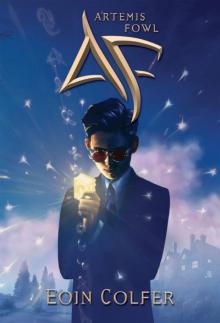 Artemis Fowl
Artemis Fowl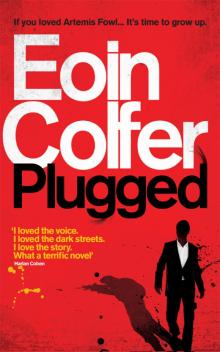 Plugged
Plugged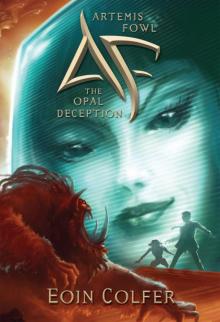 The Opal Deception
The Opal Deception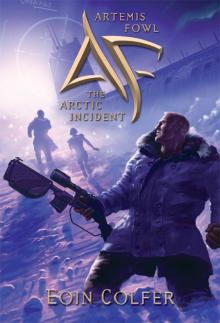 The Arctic Incident
The Arctic Incident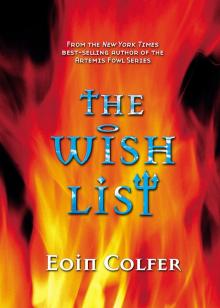 The Wish List
The Wish List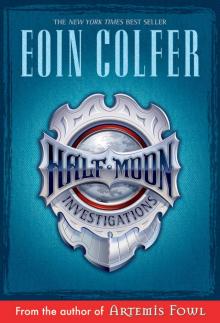 Novel - Half Moon Investigations
Novel - Half Moon Investigations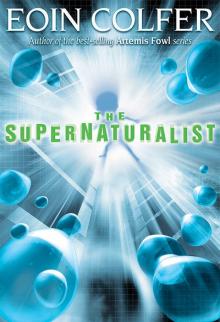 The Supernaturalist
The Supernaturalist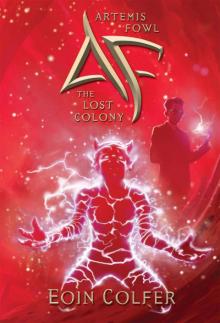 The Lost Colony
The Lost Colony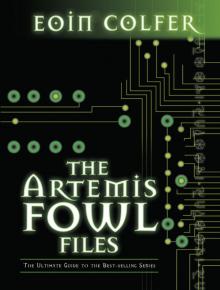 The Artemis Fowl Files
The Artemis Fowl Files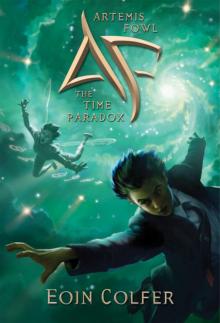 The Time Paradox
The Time Paradox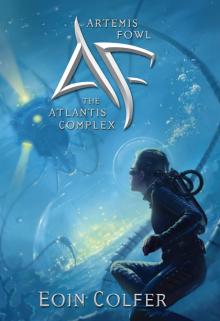 The Atlantis Complex
The Atlantis Complex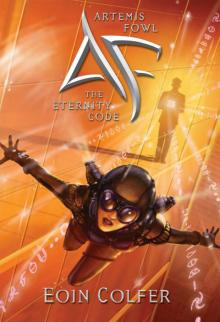 The Eternity Code
The Eternity Code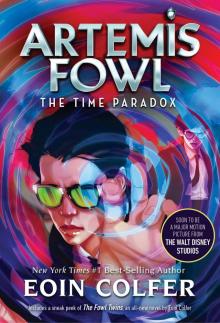 The Time Paradox (Disney)
The Time Paradox (Disney)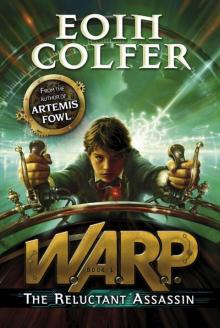 The Reluctant Assassin
The Reluctant Assassin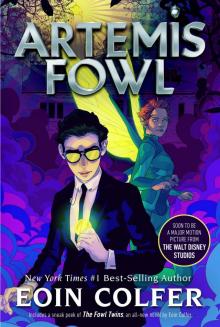 Artemis Fowl (Disney)
Artemis Fowl (Disney)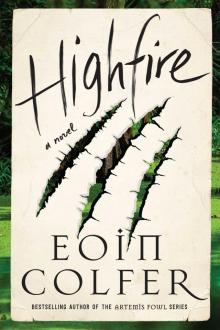 Highfire
Highfire The Last Guardian
The Last Guardian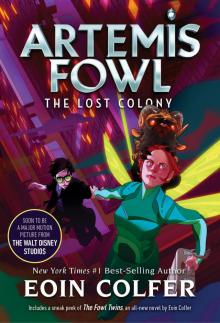 The Lost Colony (Disney)
The Lost Colony (Disney)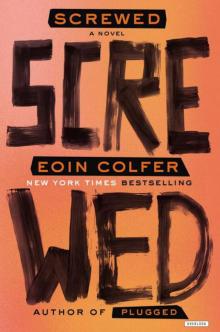 Screwed: A Novel
Screwed: A Novel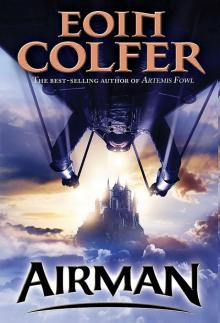 Novel - Airman
Novel - Airman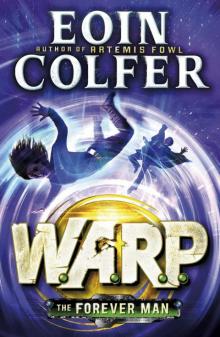 The Forever Man
The Forever Man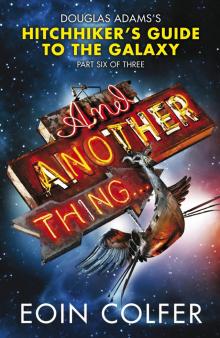 And Another Thing...
And Another Thing...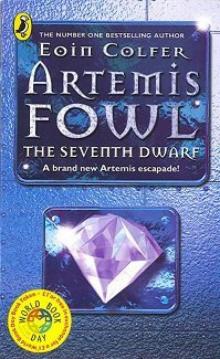 The Seventh Dwarf
The Seventh Dwarf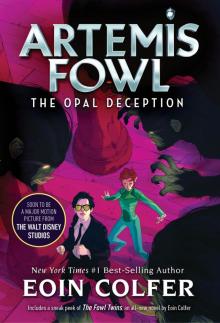 The Opal Deception (Disney)
The Opal Deception (Disney)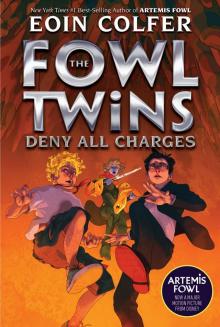 The Fowl Twins Deny All Charges
The Fowl Twins Deny All Charges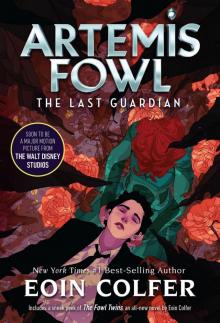 The Last Guardian (Disney)
The Last Guardian (Disney)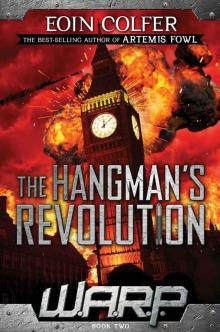 The Hangman's Revolution
The Hangman's Revolution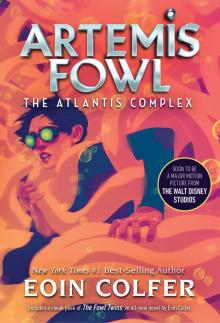 The Atlantis Complex (Disney)
The Atlantis Complex (Disney)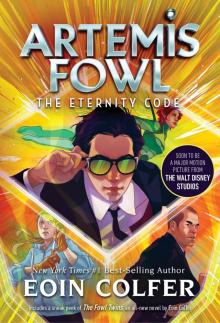 The Eternity Code (Disney)
The Eternity Code (Disney)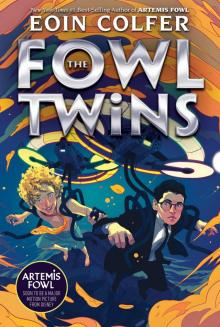 The Fowl Twins
The Fowl Twins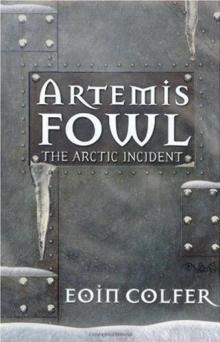 Artemis Fowl. The Arctic Incident af-2
Artemis Fowl. The Arctic Incident af-2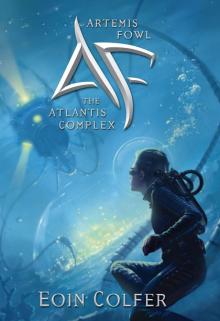 Artemis Fowl and the Atlantis Complex af-7
Artemis Fowl and the Atlantis Complex af-7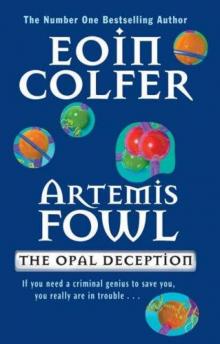 Artemis Fowl. The Opal Deception af-4
Artemis Fowl. The Opal Deception af-4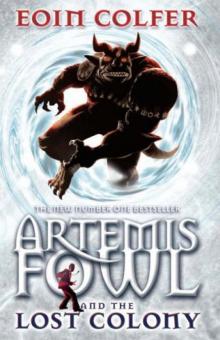 Artemis Fowl. The Lost Colony af-5
Artemis Fowl. The Lost Colony af-5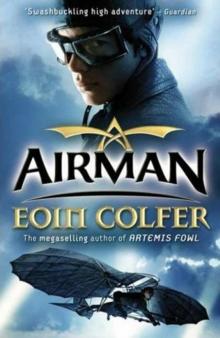 Airman
Airman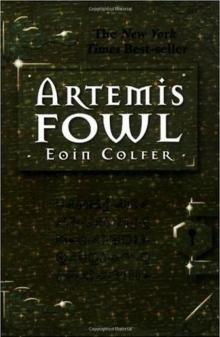 Artemis Fowl af-1
Artemis Fowl af-1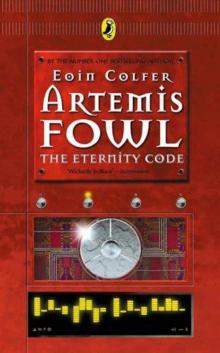 Artemis Fowl: The Eternity Code af-3
Artemis Fowl: The Eternity Code af-3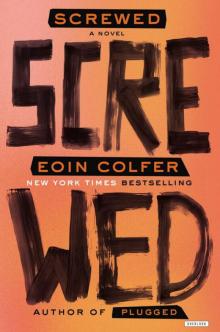 Screwed dm-2
Screwed dm-2